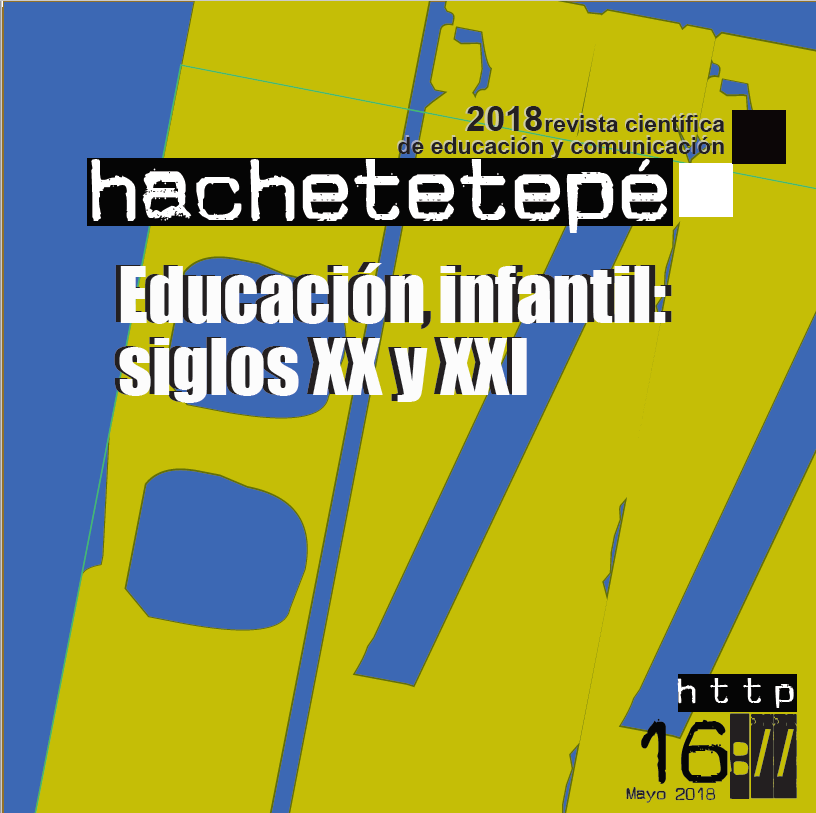Project of ecoeducation in the San Isidro children's school

Info
Abstract
At the "San Isidro" School has become aware of the importance of Eco-education for the conservation and ecological reconstruction of our world and, with it, our living conditions. The concern and awareness of the subject is greater as it delves deeper and works on it. For the social awareness of this problem it is not enough to work on it from childhood, with specific activities and objectives, but it is necessary to start from a holistic project that includes that children capture the nature of the situation and develop an active and critical awareness of intervention.
Keywords
Downloads
How to Cite
License

This work is licensed under a Creative Commons Attribution-NonCommercial-NoDerivatives 4.0 International License.
Those authors who have published with this journal, accept the following terms:
- They will retain their copyright and guarantee the journal the right to first publication of their work, which will simultaneously be subject to the Creative Commons Attribution License . They may be copied, used, disseminated, transmitted and publicly displayed, provided that the authorship, url, and magazine are cited, and are not used for commercial purposes. No derivative works are allowed.
- They may adopt other non-exclusive license agreements for the distribution of the published version of the work (e.g., deposit it in an institutional telematic archive or publish it in a monographic volume) provided that the initial publication in this journal is indicated.
- Disseminate your work through the Internet (e.g., in institutional telematic archives or on your website) once the manuscript is accepted, which may lead to interesting exchanges and increased citations of the published work. (See The effect of open access).
Hachetetepé. Scientific journal of education and communication does not charge a fee for the submission of manuscripts or for the publication of its articles.
References
AEMA, Agencia Europea de Medio Ambiente (2017). Eficiencia en el uso de recursos y residuos. Recuperado de: https://www.eea.europa.eu/es/themes/waste/intro.
Bajo, M. J. (2001). El paisaje en el currículum de Educación Primaria. Revista de Pedagogía de la Universidad de Salamanca, 13; 51-61.
Carretero, Mario. (2009). Constructivismo y Educación. Buenos Aires: Editorial Paidós.
Consejería de Educación, Junta de Andalucía. Programa ALDEA, Programa de Educación Ambiental para la Comunidad Educativa. Recuperado de http://www.juntadeandalucia.es/educacion/portals/web/aldea/programa-aldea.
Consejería de Turismo, Comercio y Deporte, Junta de Andalucía (2008). Guía del Parque natural Cabo de Gata – Níjar y su entorno.
Elías Castell, X. (2012). Reciclaje de residuos industriales. Madrid: Ediciones Díaz de Santos.
Fernández, A. y López, M. C. (2010). La educación en valores desde la Carta de la Tierra. Por una pedagogía del cuidado. Revista Iberoamericana de Educación, 53/4; 1-19.
Fernández, A. y Conde, J. (2010). La Ecopedagogía en la formación inicial de maestros. Revista Investigación en la Escuela, 71, 39-49.
Iniciativa Carta de la Tierra. Recuperado de http://cartadelatierra.org/descubra/la-carta-de-la-tierra/.
Johnson, D.W, Johnson, R.T y Holubec, E.J. (1999). El aprendizaje cooperativo en el aula. Barcelona: Paidós.
Pigem, J. (1994). Nueva conciencia, plenitud personal y equilibrio planetario para el siglo XXI. Barcelona: Integral Ediciones.
Proyecto Educativo de Centro de la Escuela Infantil “San Isidro” (San Isidro, Almería, España).
Proyecto Life, 09 NAT/ES/000534 (2014). Conservación de las praderas de Posidonia Oceánica en el Mediterráneo Andaluz. Junta de Andalucía: Consejería de Medioambiente y Conservación del Territorio.
Villegas, B.R. (2014). El reciclaje: Una estrategia para promover la creatividad bajo los principios de la Ecoeducación. Revista Academia. Vol. XIII, 59-66.

